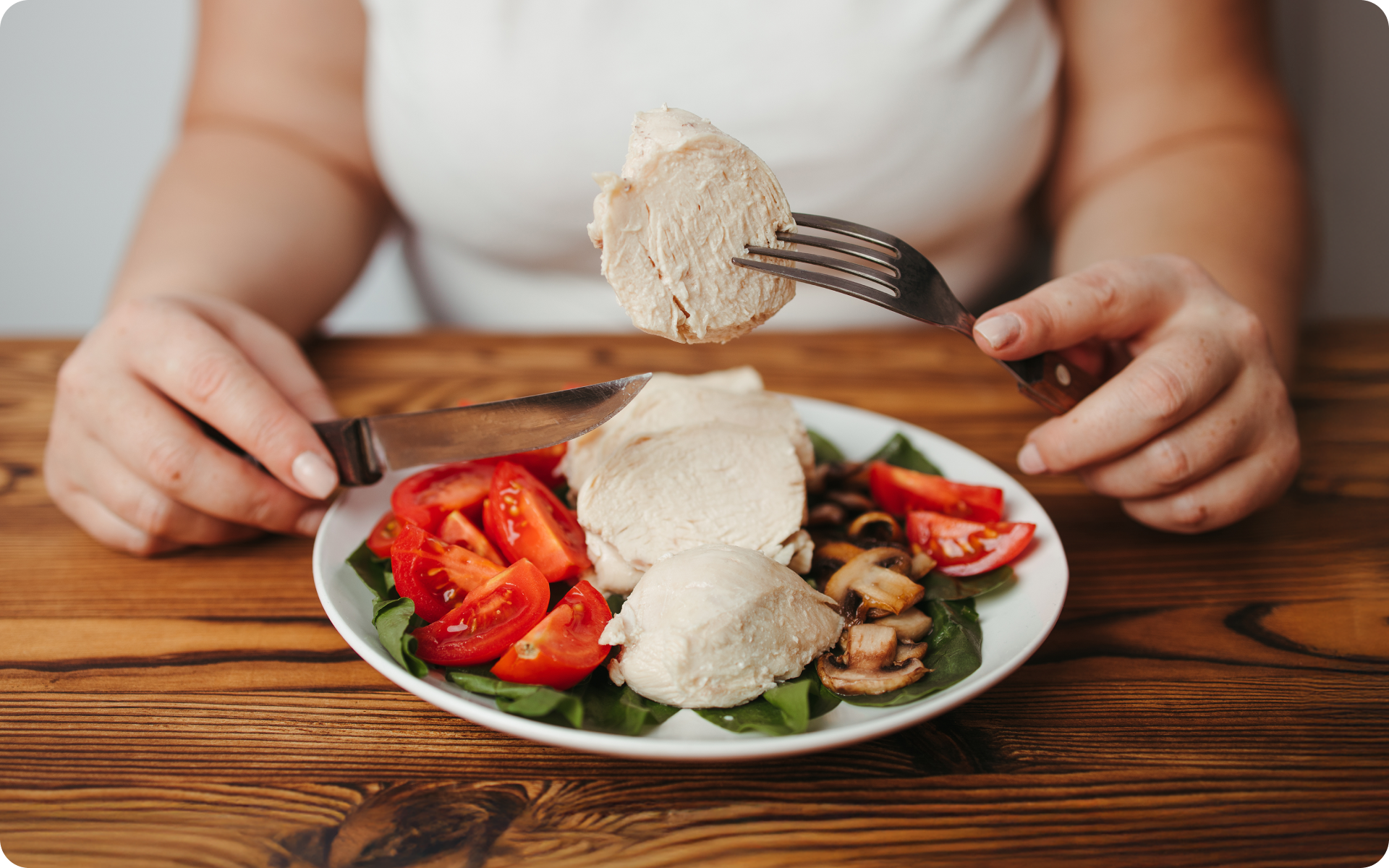An animal-based diet prioritizes the intake of animal foods, such as meat, fish, eggs, and dairy products. You may ask, “What is the difference between an animal-based diet and the carnivore diet?”
Like a carnivore diet meal plan, this approach emphasizes whole animal consumption, including organs.
Still, unlike the carnivore option, an animal-based diet can include limited amounts of particular plant foods.
While proponents claim potential benefits, there are also some significant health concerns to take into account before embarking on this diet, especially if you have any pre-existing health conditions.
Dive in to learn about the animal-based diet:
- What foods are permitted?
- Which are off-limits?
- What are the proposed health benefits and risks we should know about?
What Is An Animal-Based Diet?
An animal-based diet mainly consists of animal-derived foods.
These include all kinds of meat, organ meat (such as liver and heart), fish, eggs, and dairy (1).
Ideally, as much as possible, the main goal is to prioritize high-quality animal products, such as grass-fed or pasture-raised options.
Unlike the carnivore diet, an animal-based diet can also include small amounts of particular fruits, vegetables, and honey.
However, carnivore and animal-based diets emphasize whole, minimally processed, nutrient-dense foods and eliminate highly processed foods and refined sugars.
Is An Animal-Based Diet Healthy?
Many proponents claim that animal-based diets align with ancestral eating patterns.
While this may be true to some extent, scientific evidence suggests that this diet could lead to potential health risks. Therefore, consider this information before embarking on the benefits of all meat diets and plan significant dietary changes carefully.
Here are some of the most relevant side effects an animal-based diet could have:
- Heart Disease
Evidence shows that higher intakes of red and processed meats lead to an increased risk of heart disease. This risk is significant if you have any underlying health conditions and are considering following this diet. If this is your case, consult your doctor before substantially changing your eating patterns (2).
The BetterMe: Health Coaching app will provide you with a host of fat-frying fitness routines that’ll scare the extra pounds away and turn your body into a masterpiece! Get your life moving in the right direction with BetterMe!
- Cancer
Research has also shown a potential link with cancer, meaning that high red and processed meat intake could mean an increased risk of certain cancers, such as colorectal cancer (3).
- Nutritional Deficiencies
You should consider nutritional deficiencies when following an animal-based diet.
A limited intake of plant foods, such as fruits, vegetables, and grains, can lead to deficiencies in essential vitamins, minerals, and antioxidants not found in animal foods (4).
- Digestive Issues
A high intake of animal products could also cause the kidneys to work overtime, contributing to digestive issues such as constipation (5, 6).
Read more: Meal Planning Tips: A Beginner’s Guide
What Are The Benefits Of The Animal-Based Diet?
We all know that each diet has unique benefits.
When analyzing an animal-based diet, we notice its differences from similar styles, such as:
- The keto diet, which focuses on low carb intake
- The paleo diet, which involves whole and processed foods
- The carnivore diet, which is a strict subset of animal-based diets
Likewise, evidence has linked high-protein diets to enhanced muscle mass and strength, especially in active people.
Here are some of the proposed animal-based diet benefits:
- Reduced Inflammation
An animal-based diet can help reduce inflammation by eliminating all processed foods. Added sugars and refined grains, cornerstones of the unhealthy Standard American Diet, may promote chronic inflammation, also known as the “diseases of civilization.”
Chronic inflammation can contribute to heart disease, hypertension, type 2 diabetes, dementia, and autoimmune diseases (7). However, eating high amounts of red and processed meats may also promote inflammation and increase the risk of some chronic diseases.
- Reduced Intake Of “Anti-nutrients”
Plant foods have natural compounds that could interfere with nutrient absorption.
These compounds are known as “anti-nutrients” and include:
- Lectins
- Phytates
- Tannins
- Oxalates
- Goitrogens
Animal-based diets significantly reduce exposure to thousands of these naturally occurring “anti-nutrients” (8).
These naturally occurring plant compounds typically don’t impact our digestive system or health. However, this may depend on the person, the intake, and the overall dietary pattern.
- Aid With Digestive Issues
Animal-based diets significantly reduce the intake of FODMAPS, lectins, oxalates, and phytates. In predisposed individuals, these plant compounds could irritate and even degrade the intestinal lining (9).
However, this diet largely lacks fiber, essential for maintaining a healthy gut microbiome and a well-functioning digestive system.
For most people, meat-focused diets like these are more likely to harm gut health than have positive effects.
What Are The Rules Of The Animal-Based Diet Meal Plan?
The rules of this diet plan revolve around food.
An animal-based diet focuses predominantly on foods derived from animals, such as meat, fish, eggs, and dairy products. This approach often emphasizes whole animal consumption and limited amounts of selected plant foods.
If you plan to start your journey with an animal-based diet, here is all the information you need.
Disclaimer: This information is for general knowledge and informational purposes only. This article does not constitute medical or dietary advice. It is crucial to consult with your doctor or registered dietitian before making any significant dietary changes.
You can use this animal-based diet food list to get ideas for animal-based diet recipes.
“Low-Toxicity” Foods (Main Focus)
Animal Proteins
An animal-based diet often focuses on grass-fed ruminant animals, such as:
- Cattle
- Buffalo
- Goats
- Lamb
- Deer
Many people include poultry, pork, and fish, but usually no more than twice a week.
Organ Meats
These are also a central component of an animal-based diet. The liver, heart, bone marrow, and other organs contain unique and vital nutrients.
Free-Range Or Pastured Eggs:
Eggs are a nutritional powerhouse, offering a valuable blend of high-quality protein, healthy fats, and essential vitamins and minerals.
Eggs contain high-quality, bioavailable protein. At one point, they represented the gold standard against which other dietary proteins were compared (10).
Dairy Foods
Cheese, butter, milk, and yogurt are crucial additions to an animal-based diet, providing calcium, protein, and other vitamins and minerals (11).
Some proponents recommend choosing raw, unpasteurized milk from grass-fed cows.
However, raw milk can also pose health concerns, increasing exposure to harmful bacteria, especially for vulnerable populations, such as:
- Adults over 65
- Children under 5
- Pregnant women
- People with weakened immune systems (12).
Although raw milk has no significant nutritional advantages over pasteurized milk, it poses considerable health risks, and most health professionals advise against it.
Fat Sources
Experts recommend the following for an animal-based diet:
- Butter
- Tallow
- Ghee
- Lard
Most practitioners reduce or avoid vegetable and seed oils, such as canola, corn, soybean, sunflower, and peanut oil.
Produce
So, can you eat veggies on an animal-based diet?
As mentioned above, some particular fruits, vegetables, and honey can be part of an animal-based diet.
For example, some people include what they call “low-antinutrient” produce such as:
- Berries
- Apples
- Oranges
- Pineapple
- Pears
- Melons
- Bananas
- Mangoes
- Dates
- Zucchini
- Squash
- Pumpkin
- Cucumber
- Avocado
- Olives
Sweeteners
- Raw honey
- Maple syrup.
Seasonings
- Rosemary
- Cilantro
- Thyme
- Basil
- Salt
Beverages
- Water
- Bone broth
- Coconut water
- Fresh fruit juice
“Medium-Toxicity” Foods (Include In Moderation)
Pork, conventionally fed poultry, and wild-caught fish have medium-toxicity due to the potential contamination with heavy metals.
Fruits and vegetables supposedly richer in anti-nutrients include:
- Yams
- Rhubarb
- Carrots
- Starfruit
- Pickles
- Sauerkraut
- Sweet potatoes
Fats:
- Dark chocolate
- Coconut oil
- Avocado
- Olive oil
Seasonings:
- Dill
- Mint
- Parsley
- Oregano
- Cinnamon
- Coconut aminos.
Drinks:
- Coffee
- Tea
BetterMe: Health Coaching app helps you achieve your body goals with ease and efficiency by helping to choose proper meal plans and effective workouts. Start using our app and you will see good results in a short time.
“High-Toxicity” Foods (Try To Avoid Or Limit)
Seed and nut oils include:
- Canola
- Soybean
- Sunflower
- Safflower
- Rice bran
- Peanut
- Corn
- Soy
Vegetables supposedly higher in anti-nutrients include:
- Kale
- Beets
- Onions
- Garlic
- Broccoli
- Cauliflower
- Brussels sprouts
- Cabbage
- Horseradish
- Radishes
- Watercress
- Bok choy
- Cassava
- Peppers
- Goji berries
- Tomatoes
- Egg plant
Other “High-Toxicity Foods”:
- Grains
- Nuts and seeds
- Artificial sweeteners
- Highly processed foods
It is important to note that these “toxicity” designations are controversial and not evidence-based.
Healthcare and nutrition professionals maintain that fruits, vegetables, whole grains, legumes, nuts and seeds, and vegetable and seed oils are healthy and essential to a balanced diet.
Read more: Weekly High-Protein Meal Plan: Balanced Nutrition for Muscle Preservation and Weight Loss
What Is The Controversy With The Animal-Based Diet?
Other than health concerns, some of the most relevant concerns or controversies regarding an animal-based diet may include its environmental impact.
Animal farming has a considerable environmental footprint, which means that compared to plant-based food production, we need much more land, water, and energy resources to grow animals (13).
For example, to produce 1 kg (2.2 pounds) of beef, we must spend approximately 15,000 liters of water. In contrast, to make the same amount of vegetables, we only need around 322 liters.
Animal farming also demands extensive land for grazing and feed production, leading to:
- Biodiversity loss
- Deforestation
- Habitat loss
Additionally, livestock production is one of the main contributors to greenhouse gas emissions, which can directly and significantly impact climate change.
Animal farming accounts for 65% of the total nitrous oxide emissions worldwide.
This gas has a more far-reaching impact on global warming than carbon dioxide (13, 14).
Yes, you can eat bananas on an animal-based diet. While bananas are fruits, animal-based diet experts categorized bananas as a “low-toxicity” plant food that could be part of a well-planned animal-based diet. Yes, Greek yogurt is generally a great food to add when following an animal-based diet. It’s a high-protein milk-derived product to add daily. Coffee is a plant-based drink in the “medium-toxicity” food category. You can fit coffee into an animal-based diet, but only in moderate amounts. However, if you drink coffee, prefer black coffee without any added processed creamers or sweeteners. Milk is an animal product, meaning it can be part of your daily animal-based diet. Some proponents suggest raw milk and dairy, but this could pose some health concerns, increasing your exposure to harmful bacteria without significant nutritional benefits.Frequently Asked Questions
Can you eat bananas on an animal-based diet?
Is Greek yogurt animal-based?
Can you drink coffee on an animal-based diet?
Can you drink milk on an animal-based diet?
The Bottom Line
An animal-based diet primarily consists of foods derived from animals, such as meat, fish, eggs, and dairy products. This approach often emphasizes the consumption of whole animal products, including organs, and may include limited amounts of carefully selected plant foods.
While followers of this dietary pattern claim some potential health benefits, such as aiding with particular digestive issues and reducing inflammation, there are also many serious health concerns, including heart health and nutrition deficiencies.
An animal-based diet can be restrictive and not suitable for everyone, especially those with underlying health conditions. Before making any significant dietary changes, it is best to consult with your doctor or dietitian.
Consulting with a healthcare professional or registered dietitian is crucial for assessing your needs and determining whether an animal-based diet is suitable and safe.
The information shared in this article is for general knowledge and informational purposes only and does not constitute medical or dietary advice.
DISCLAIMER:
This article is intended for general informational purposes only and does not serve to address individual circumstances. It is not a substitute for professional advice or help and should not be relied on for making any kind of decision-making. Any action taken as a direct or indirect result of the information in this article is entirely at your own risk and is your sole responsibility.
BetterMe, its content staff, and its medical advisors accept no responsibility for inaccuracies, errors, misstatements, inconsistencies, or omissions and specifically disclaim any liability, loss or risk, personal, professional or otherwise, which may be incurred as a consequence, directly or indirectly, of the use and/or application of any content.
You should always seek the advice of your physician or other qualified health provider with any questions you may have regarding a medical condition or your specific situation. Never disregard professional medical advice or delay seeking it because of BetterMe content. If you suspect or think you may have a medical emergency, call your doctor.
SOURCES:
- Animal-based food choice and associations with long-term weight maintenance and metabolic health after a large and rapid weight loss: The PREVIEW study (2022, sciencedirect.com)
- Red and processed meat consumption and risk of incident coronary heart disease, stroke, and diabetes: A systematic review and meta-analysis (2010, pmc.ncbi.nlm.nih.gov)
- Pattern of DNA Damage Links Colorectal Cancer and Diet High in Red Meat (n.d, cancer.gov)
- Nutrient Intake and Status in Adults Consuming Plant-Based Diets Compared to Meat-Eaters: A Systematic Review (2021, pmc.ncbi.nlm.nih.gov)
- The Effects of High-Protein Diets on Kidney Health and Longevity (2020, pmc.ncbi.nlm.nih.gov)
- Association between Dietary Factors and Constipation in Adults Living in Luxembourg and Taking Part in the ORISCAV-LUX 2 Survey (2021, pmc.ncbi.nlm.nih.gov)
- The Western diet and lifestyle and diseases of civilization (2011, researchgate.net)
- Phytate in foods and significance for humans: Food sources, intake, processing, bioavailability, protective role and analysis (2009, onlinelibrary.wiley.com)
- Antinutritional properties of plant lectins (2004, researchgate.net)
- The Health Benefits of Egg Protein (2022, pmc.ncbi.nlm.nih.gov)
- A Nutritional Comparison of Cow’s Milk and Alternative Milk Products (2021, pmc.ncbi.nlm.nih.gov)
- Raw Milk (n.d, cdc.gov)
- Sustainability of meat-based and plant-based diets and the environment1 (2003, sciencedirect.com)
- It may be uncomfortable, but we need to talk about it: the animal agriculture industry and zero waste (n.d, colorado.edu)













